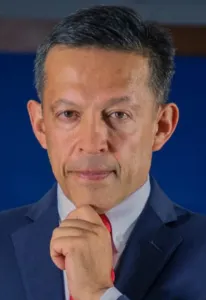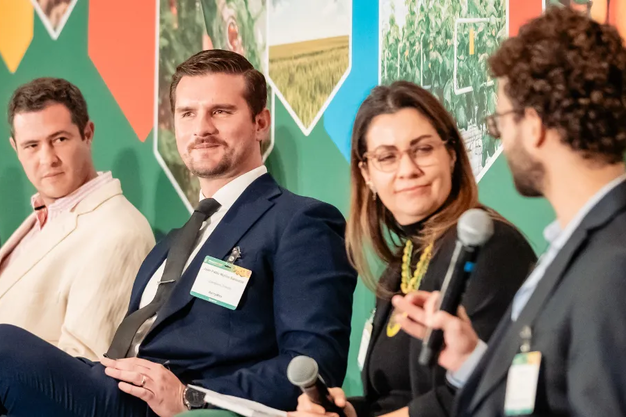The World Agri-Tech Innovation Summit takes place in Mexico City on October 28 to 29, bringing together fintech companies, development banks, and agribusiness leaders to discuss the evolution of smallholder finance across Latin America.
Access to credit remains one of the toughest barriers for small producers, but digital lending, risk-sharing tools, and public-private partnerships are beginning to shift the landscape.
Faster credit, built for farmers © World Agritech Innovation Summit
© World Agritech Innovation Summit
"Farmers can't wait 30 or 60 days for a bank to decide. We approve in less than 72 hours, making us the fastest option in the market," says Hugo Garduño Ortega, CEO of Verqor. "The entire credit journey is mobile. Farmers upload documents, track applications, and receive responses on their phones, with WhatsApp as the central communication channel."
Repayments align with crop cycles rather than rigid monthly schedules, while advanced scoring expands access. "Our model layers satellite imagery, geolocation, crop cycles, and buyer contracts to evaluate real capacity rather than bureau scores," Garduño Ortega explains. "It opens the door to farmers who would otherwise be excluded."
Hugo Garduño Ortega, CEO of Verqor (right)
Cutting risk with guarantees and green finance © World Agritech Innovation Summit
© World Agritech Innovation Summit
"Credit and guarantee products are essential in enabling smallholders to access finance, alongside risk-mitigation mechanisms such as crop insurance, price hedging, and participation of value-chain players through contract farming schemes," says Alan Elizondo, General Director at FIRA.
He notes that sustainability incentives are gaining traction. "Lower interest rates for adopting eco-friendly technologies, or green and social bonds targeting smallholder finance, have proven successful in mobilizing resources." Digital tools are also extending reach. Farmers are adopting satellite imagery, soil-moisture sensors, and advisory platforms to lift productivity and manage risk without high costs.
Alan Elizondo, General Director at FIRA (right)
Credit plus access to buyers
"Finance alone is not enough," Garduño Ortega says. "At Verqor, we connect producers directly with exporters and retailers who need reliable suppliers. Farmers not only get credit, they also secure stable sales and better prices."
Elizondo points to the role of public programs. "Collaborative digital marketplaces, open-data platforms, and logistic hubs supported by public financing can lower transaction costs and improve visibility for small farmers."
Fintechs, banks, and government at the table
"The next step is aligning fintechs, banks, and governments into a true ecosystem," says Garduño Ortega. "Collaboration needs to start with public institutions expanding guarantee programs and investing in digital infrastructure. Fintechs bring agility to execute, while banks provide the capital."
Elizondo adds: "Successful collaboration means co-creating solutions where fintechs push innovation, banks provide scale, and public programs foster the enabling environment. Together, these actors can set open-data standards, reduce risk, and strengthen smallholder farming at scale." © World Agritech Innovation Summit
© World Agritech Innovation Summit
Shaping smallholder finance in Mexico and beyond
Smallholder farmers produce a large share of Mexico and Central America's food supply, yet their growth has long been held back by limited capital and market access. Faster, smarter, and more inclusive finance is shifting that dynamic.
At the World Agri-Tech Innovation Summit in Mexico City, more than 400 delegates will discuss these changes in detail. Sessions will spotlight smallholder finance, irrigation under climate stress, and cold chain logistics for new markets. A pre-summit activity will take place on Monday, October 27, departing Marquis Reforma Hotel at 12:30 and returning at 17:00 ($100 including transport and refreshments).
For more information:
World Agri-Tech Innovation Summit![]()
Andrea Diaz Soria, Marketing Manager
[email protected]
www.worldagritechmexico.com
